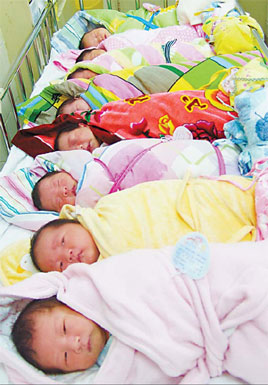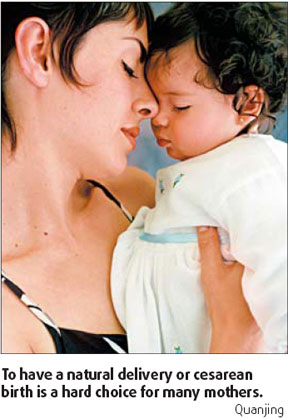Mavis Chu has a healthy 6-month-old boy. She wanted a natural delivery but was advised by her doctor to have a cesarean birth because of a previous surgery on her lungs and the size of her baby, 3.9 kg.
Afterward, the 28-year-old Beijing media manager says it was nine days before she was able to walk around and for the first three days it was painful to even hold her baby. She has a large scar because of the incision through the abdominal wall and uterus, but this does not worry her too much.

China's major cities have seen an increase in cesarean births over the years.
She is more concerned about the effect of the operation on her baby. She thinks it took longer to express milk because of the discomfort she felt and believes he would have been more content and less clingy if he had been born naturally.
"There were negative influences. He needs security and cries a lot. If I had the choice again I would go natural, as maybe it is better for babies."
In the world's most populous country there has been a profound change in the way children are brought into the world. Here, women in its major cities are leading a worldwide trend of giving birth by surgical removal, rather than vaginally.
Cesarean births are necessary in about 15 percent of cases according to the World Health Organization (WHO). In a study last year it said there has been a doubling in the last decade, mostly in Western countries. Italy has a rate of 32 percent, while the United States is 23 percent and Germany 22 percent.
The number of cesarean births has increased in developing countries too, like Brazil and India, but maternity wards in Chinese cities have transformed the way they operate like no other.
Media reports and anecdotal evidence suggest a rate of 70 percent at some Beijing hospitals, while the China Eugenic Science Association reported an average of 48 percent in China's major cities at the end of 2004. It suggested wealth, medical insurance and education were indicators of more cesarean births.
Warren Brooks, chairman of the department of obstetrics and gynecology at United Family Hospitals and Clinics in Beijing, favors natural delivery when possible.
He says common indications for a C-section are failure to progress with vaginal delivery, health problems of the child or mother, and maternal, fetal and midwife/doctor distress.
He believes better training can reduce midwife/doctor distress and says babies born by C-section have a higher morbidity rate than vaginal births, often because of breathing problems. "Fetal stress can, perhaps, prepare the baby for life. Help the child to breathe."
He cites a number of reasons given by doctors for carrying out a C-section and says some of them are "dubious":
Breech birth.
Birth cord around the neck. This happens in a third of births and is not usually a problem.
Cosmetic reasons. Some men worry their partner's vagina will be bigger after natural delivery.
Some doctors advise a C-section because they are more profitable.
It's more convenient for the surgeon, who prefers working a day shift rather than be on call through the night.
"In Western countries like the United States and England there are legal reasons why C-section is the apparent gold standard. If there are problems the first question that is asked is, 'Why wasn't a C-section done?' It's about tin plating the backside."
Even so, Brooks says this attitude is changing as insurance companies, an unseen but influential hand, are now asking hospitals to validate cesarean births by asking what medical conditions led to them, before paying out.
Though Bradley method childbirth teacher Kathi Levitan says "natural childbirth" is an overused term because "it's been a long time since women gave birth in the woods" and nearly all deliveries require some medical assistance, she believes natural is best for a number of reasons.
"People forget a cesarean birth is major abdominal surgery and this has risks. We don't have a zipper and some of the infections you pick up in hospitals are the most serious you can have. Some of these super bugs you can only get in hospitals."
"There is not the same risk to vaginal births. Some babies need to be born by C-section for various reasons, but many mothers feel empowered by giving birth to their own baby vaginally."
While most medical professionals say they follow the International Federation of Gynecology and Obstetrics line that "performing cesarean operations for non-medical reasons is ethically unjustified", the numbers show many mothers are opting for cesarean births, and surgeons are recommending them and carrying them out.

Mrs Yang, a communications director in Beijing who requested we use just her surname, delivered her 3.2 kg boy naturally, but only did so because her waters broke two weeks early.
Her doctor had counseled a cesarean birth, saying her red-blood cell count was low and he feared blood loss. It turned out there was no problem with her spontaneous delivery that took 10 hours. She stayed in hospital five days, which was "pretty long for a natural delivery".
"I'm glad I had a natural birth because I do believe it is best for the baby. I don't think consideration of the pain factor is paramount - but that is looking back."
As to why China's urban women are leading the world in cesarean births, China-Japan Friendship Hospital pediatrician Yu Huan says it is official policy for Chinese doctors to encourage natural delivery when possible.
"But unlike the West, I believe many people here over the past seven to eight years have learned to reject their doctor's advice."
She adds newspapers and Internet websites suggest advances in science have made C-sections safer. Hence parents request them.
She offers other reasons why cesarean births are more prevalent.
Women are older, on average, when giving birth.
A larger proportion have diabetes and hypertension.
They are not as fit as previous generations, as they do not exercise and have sedentary jobs.
Babies are generally bigger, around 3.5 kg to 4 kg and harder to deliver, as Chinese women are generally smaller than Western women.
Yu admits the country's one-child policy has some bearing on the rate of cesarean births, as mothers do not have to worry about the risks of having more children after a C-section. In the West, women who want large families are advised not to have multiple elective cesarean births.
However, she disputes the idea of a profit motive for doctors suggesting C-sections, as they are not paid directly by the patient and the differential in cost is relatively minor, around 3,000 yuan ($423) for a vaginal delivery and 3,800 yuan ($536) for a cesarean delivery. This situation may be different at some private hospitals for high-income families, she concedes, where it costs up to 100,000 yuan ($14,113).
While new parent Mavis Chu says some friends elected to have cesarean births at a private hospital because it meant they could book a room and ensure the doctor they had chosen would perform the surgery, Yu says this situation does not apply at public hospitals. Hospital beds are in shared dorms.
While Chu reckons one-third of the people she knows believe an auspicious birth date is important for their baby's future wealth and happiness, Yu admits this can be a factor but not a major one.
Though everyone appears to agree the safety of mother and child is paramount, it is clearly not the only issue and continued scientific advances could change the picture of what is the best practice for giving birth. Meanwhile, in the foreseeable future, around half of the children in China's cities will be delivered by a surgeon rather than mother.
(China Daily March 19, 2008)